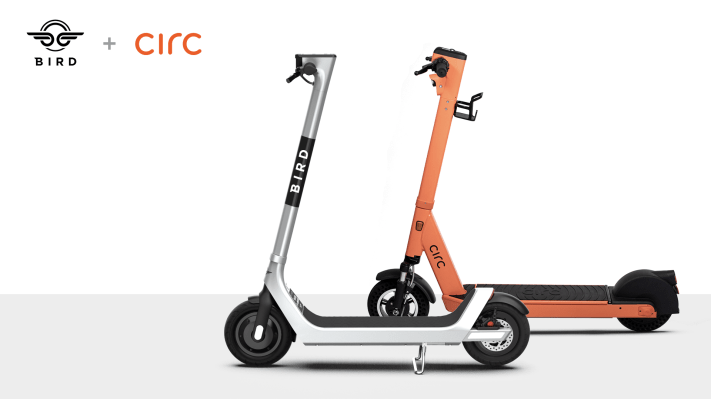Bird has shut down scooter sharing in several cities in the Middle East, an operation that was managed by Circ, the micromobility startup it acquired in January. About 100 Circ employees have been laid off and as many as 10,000 Circ scooters have been sent to a third-party UAE-based company for recycling, according to multiple industry and company sources who asked not to be named because they weren’t authorized to speak with the media.
The shutdown — which Bird has couched as “pausing of operations” — comes less than six months after LA-based Bird announced it had acquired its European counterpart and touted plans to expand. Bird’s decision to shut down Circ’s entire Middle East business affects operations in Bahrain, UAE and Qatar.
Between 8,000 and 10,000 Circ scooters have been sent to EnviroServe, a UAE-based company that recycles electronics and other products, multiple sources who asked not to be named told TechCrunch. Almost 1,000 of the Circ scooters were new, according to one source.
Bird said in a statement that it is not leaving the Middle East. Instead, the company said it is “pausing operations” and plans to return to the region in the fall. Bird is still operating its own service in Tel Aviv.
“Bird is currently operating in Tel Aviv and we have temporarily paused operations in other parts of the Middle East as they become increasingly hotter at this time of the year,” the company said in an emailed statement. “During this pause, we are taking the opportunity to responsibly recycle parts of the old Circ fleet that were previously used in the region. Following extreme wear and tear, the Circ vehicles no longer met our rigorous quality standards. Selling or re-use of these vehicles would potentially result in safety and reliability issues, which would not have been fair or ethical to the purchasers or potential riders. We look forward to resuming our service throughout more parts of the region later this year.”
TechCrunch learned that several companies, including Berlin-based Tier Mobility, offered to buy the Circ-branded scooters that have been taken off the streets in Dubai and other Middle East cities. Bird declined these offers, according to two sources.
In the past two months, tens of thousands of electric scooters and bikes have been scrapped in the U.S., Canada, Europe and now the Middle East as micromobility companies pull back from markets in an effort to cut costs amid the COVID-19 pandemic.
Photos and videos showing piles of scrapped bright red JUMP bikes spread across Twitter last month and sparked widespread criticism and anger among bike advocates, urban planners and industry watchers. The bikes were part of the collateral damage that stemmed from a complex deal between Lime and Uber. Last month, Lime raised $170 million in a funding round led by Uber. As part of the deal, Uber offloaded JUMP, which it had acquired in 2018 for $200 million, to Lime. All 400 JUMP employees were laid off and at least 20,000 bikes and scooters were scrapped in the U.S. alone. Reports of JUMP bikes being pulled off streets and sent for recycling have popped up in Canada as well.
Tier Mobility CEO and co-founder Lawrence Leuschner had offered to buy the JUMP bikes. Tier Mobility also reached out to Bird.
“That has nothing to do with sustainable mobility and it needs to have consequences,” Leuschner said in a recent interview discussing the decision by companies to scrap scooters and bikes. “This is not what the industry should stand for and that’s why I have to speak up.”
Leuschner, who previously founded reBuy, a European market leader in used electronics, has said it is possible to properly and safely refurbish scooters and sell them to consumers. Tier Mobility refurbished and sold its old e-scooters to consumers after it replaced most of its fleet with newer hardware.
Circ burst on the scene in January 2019 with €55 million in Series A funding. The Berlin-based e-scooter startup, which was initially called Flash before it was rebranded, was founded by Delivery Hero and Team Europe founder Lukasz Gadowski.
The company expanded quickly across Europe and eventually into the Middle East. Just six months after it came out of stealth, Circ was in 21 cities across 7 countries — and it expanded even further throughout the rest of the year. But it encountered some of the same setbacks that other scooter-sharing companies faced in 2019. The company laid off staff in November at its regional operations and Berlin headquarters. The reduced headcount was driven by the fluctuation in users across seasons, “operational learnings” and a move to e-scooters with swappable batteries, Gadowski told TechCrunch at the time.
